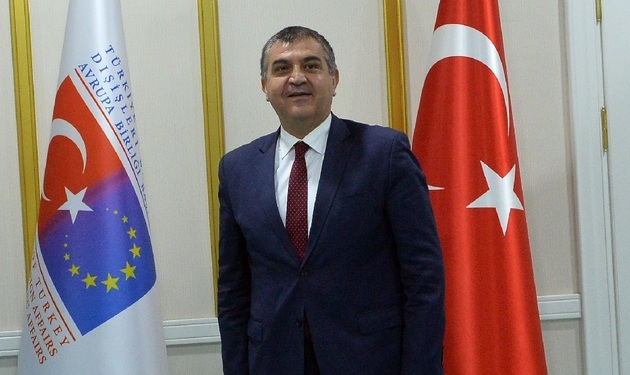Yesterday, Moscow hosted regular consultations between deputy heads of foreign affairs departments, Alexander Pankin and Faruk Kaymakci, within the framework of the Russian-Turkish MFAs cooperation. The diplomats discussed the possibilities of interaction in such key formats as the G20, the WTO and the Black Sea Economic Cooperation Organization, the 30th-anniversary summit of which is to be held in Istanbul this summer.
"Support was expressed for the G20 as the leading coordinating mechanism in the system of global economic governance. The state and prospects of world energy markets were discussed, including in the light of the challenges of climate change, the trade consequences of individual initiatives within the Green Deal, socio-economic aspects of international migration, the contributions of Russia and Turkey to the global efforts in COVID-19 vaccination,” the Russian Foreign Ministry said.
Faruk Kaymakcı, Turkey's former ambassador to the European Union and had obtained a masters from the College of Europe in Bruges, whose alumni are found throughout the EU institutions. On the eve of Moscow's visit in an interview with EU Observer he explained that Turkey remains sidelined for membership of the European Union, yet, there remains a strong determination to restart EU accession discussions - and even some optimism about one day getting them back on track.
"Turkey's EU accession perspective should be retained, and even further strengthened in the interest of both sides," Faruk Kaymakcı said. To be sure, regular contacts between Brussels and Ankara are ongoing on a wide range of topics despite the simmering tensions over Turkey's autocratic drift and its frictions with EU member Greece. Kaymakcı's comments follow high-level meetings with European commissioners on issues ranging from climate change to foreign policy held last year.
And some analysts in Turkey do see positive impacts domestically in keeping alive the accession objective. "Firstly, being an accession country has implications for the domestic order," said Sinan Ulgen, the chairman of the Istanbul based think tank the Center for Economics and Foreign Policy Studies. "It provides a more favourable environment for defending political and economic reforms at home," Ulgen told EUobserver. Turkey also gets "a range of privileges regarding its relationship with the EU that extends in many different domains and that have implications not only for the Turkish state, but also for Turkish citizens that live in the EU countries," Ulgen said.
Yet the one overriding issue that continues to keep the EU and Turkey in a delicate dance over accession may be migration. The EU wants Turkey to keep hosting some four million mostly-Syrian refugees as it reinforces its external borders, most recently with Belarus, and in the wake of the Taliban (the organization prohibited in Russia) takeover of Afghanistan.
In exchange, the EU has dispersed over €4bn, out of €6bn contracted to mainly NGOs and international aid organisations working with the refugees in Turkey. The EU topped up its assistance last year with an additional €3bn until 2023, according to the spokesperson for the European Commission. The money is part of the 2016 EU-Turkey statement, which included other proposals on visa-liberalisation, trade, and improving humanitarian conditions inside Syria. Yet few of those proposals have been enacted amid increasing frustrations from Ankara, which wants the new additional funds.
"What we are repeatedly saying is that the new migration deal especially after the Afghan crisis, has to focus on cooperation and return of Syrians to northern Syria, cooperation on the Turkish-Iranian border, joint action in the source countries and fair burden-sharing in terms of financial support and resettlement," Kaymakcı said in an email interview with EUobserver.
Kaymakcı welcomed the additional EU funds, but said the Turkish state has alone spent more than €40bn on the refugees. "Where is the fair burden-sharing?" he asked.
When it comes to readmission of migrants, Turkey had taken back 2,300 Syrians from the Greek islands but has balked at taking a further 1,000, as requested by Athens, sparking further tensions. Kaymakcı says Greece first needs to return Turkish nationals it claims were part of the failed coup. It also wants Athens to shift its policy of declaring Turkey not safe for Turkish citizens but safe for irregular migrants. "Unless Greece reverses its policy on these issues, Turkey will retain the current position and not take anyone from Greece," said Kaymakcı.
Turkey was granted candidate status in 1999, opening accession chapters in 2005. So far only 16 of 35 such chapters have been opened, and one on science provisionally closed. The European Commission, in a report last year, also painted a bleak picture, accusing Turkey of democratic backsliding, squeezing out civil society and launching criminal cases against journalists, human rights defenders, and others. "Our sole priority, as in many other democracies, is to strike a proper balance between maintaining public order and security and protection of the freedom of expression," said Kaymakci.






